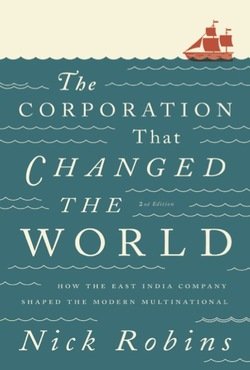By Nick Robins
The English East India Company was the mother of the modern multinational. Its trading empire encircled the globe, importing Asian luxuries such as spices, textiles and teas. But the Company’s takeover of much of India was achieved by force and fraud; in China, the battering ram was opium. The East India Company’s corruption and violence shocked its contemporaries and still reverberates today. The Corporation That Changed the World is the first book to examine the Company’s enduring legacy as a corporation. It uncovers the factors that drove it to excess and eventual collapse. This expanded edition looks at recent activist and cultural responses to the Company in China and India, and the corporate reform agenda in light of the economic crisis. In his account of the Company's story Robins highlights enduring lessons on how to make global business accountable. This will be vital reading for students and academics in economics and history.
London: Pluto Press, 2012. 281p.




